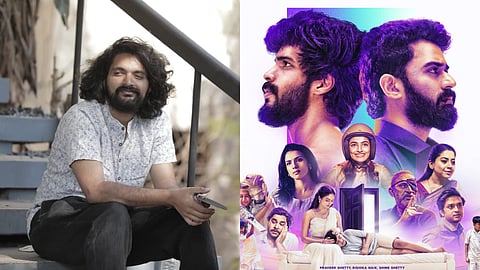

When Christopher Nolan’s Interstellar opened in theatres, a young Suraag Sagar walked out transformed. “The experience I went through watching Interstellar—the way it made me feel—I just wanted to give the same kind of feeling to people,” he recalls. “That was my first point of inspiration. The power of storytelling, the emotions in that film, they moved me deeply. That’s when I knew I wanted to tell stories that could touch people the same way.”
That moment of cinematic awakening pushed Suraag, who had been dabbling in short films, into filmmaking seriously. His time at Prague Film School, where Thithi director Raam Reddy also studied, cemented his calling. “I did a thesis film called Entropy. That was a turning point—it earned me a name as an acclaimed short filmmaker and gave me the confidence to pursue feature films.
Now, Suraag makes his feature debut with Nidradevi Next Door, a romance-drama with an unusual hook: an insomniac whose world unravels until he meets a mysterious woman who brings him peace. “If you have love, you have peace; if you have peace, you have sleep,” he explains. “Everyone has struggled with sleeplessness at some point, but what if the reason behind it is an emotional scar? That’s what drew me to the story," says Suraag, ahead of the film's release on September 12.
The film marks the debut of Praveer Shetty and stars Rishika Naik in lead roles, alongside Shine Shetty, Sruthi Hariharan, and veteran Sudharani. “Praveer comes from Anupam Kher's acting school, so syncing with him was easy since he has that method and discipline,” says Suraag. “Rishika brought freshness. Shine is seen in a different light, while Sruthi Hariharan, who is known for her powerful roles, plays with restraint. And Sudharani brings sheer grace to the screen.”
Working with his lead cast, Suraag avoided rigid rehearsal. “After the script reading, I told them to keep it aside for a while. I explained the situations, and we did free-flow rehearsals. That way, when they came back to the script, they connected more deeply. Their instincts shaped the performances.”
Interestingly, Nidradevi Next Door breaks away from the conventional three-act format. Was he nervous? “Not really,” he says. “The first half sets up the world and makes you wonder why things are happening, while the second half answers everything. Every character carries trauma, and they resolve it differently. The structure is not textbook, and certain sections of audience at the premiere in Mumbai have already given us a big thumbs-up.”
Authenticity, for Suraag, is non-negotiable. “Only when we are authentic can the audience truly connect,” he insists, and agrees that today’s young directors are drawn to emotionally complex stories. "Cinema shouldn’t be about formulas, it should be about experiences,” he adds.
Backing him is producer Jayaram Devasamudra, who has invested heavily in both performance and craft. “A big chunk of the budget went into actors and VFX,” Suraag explains. “We had to create dream worlds in black and white, and those visuals required technical precision. Jayaram, as producer, gave us that freedom.”
Music and cinematography play vital roles in elevating the film’s emotional core. “Nakul Abhyankar, who has worked closely with AR Rahman has composed the score. His melodies, especially the romantic ones, are top-notch and lift the film,” says the director. “Cinematographer Ajay Kulkarni brought nuance to every frame. Through the lens, the audience feels the emotional shifts the characters go through. We kept the visual grammar simple with classical movements, subtle experiments with color grading, and attention to mood over spectacle.”
Looking back, Suraag sees Nidradevi Next Door not just as a debut but as a statement. “The sleeplessness is both literal and metaphorical,” he reflects. “It’s about love, healing, and the inner demons we all wrestle with. More than a story, it’s an emotional experience. That’s what I want cinema to be.”
With Nidradevi Next Door, Suraag Sagar is chasing personal, emotionally resonant stories over formula-driven spectacles. "The dream isn’t just to make films but to move people the way Interstellar once moved me," he concludes.